Covers your pet up to the chosen vet fee limit if they have a dental accident or injury. Always be sure to take your pet for annual dental check-ups, and follow your vet’s advice.
A true gentle giant, the Bernese Mountain Dog is calm, happy and handsome. Friendly and affectionate, they love being with their family, and are good with kids and other pets. They are prone to certain health conditions though, and as a large breed, their life expectancy isn’t as long as many other dogs.
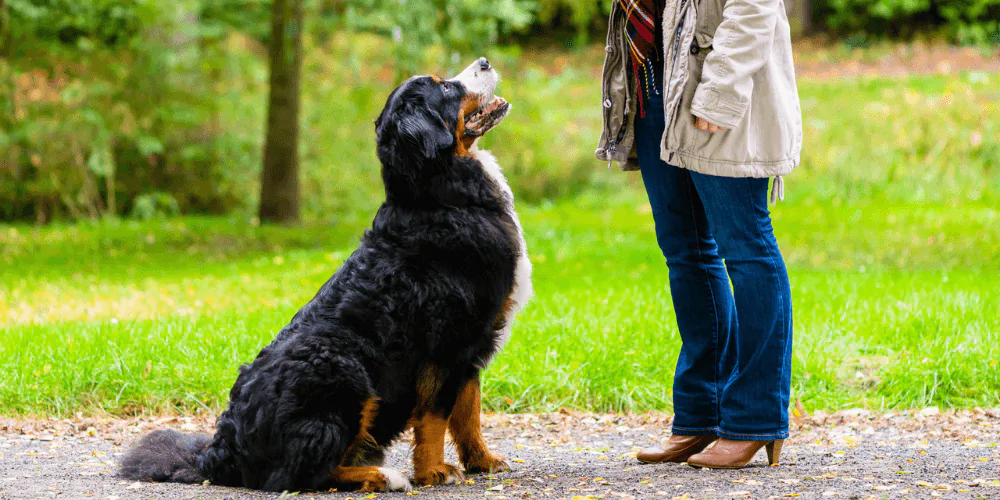

A guide to owning a Bernese Mountain Dog
The Bernese Mountain Dog is a large, gentle, affectionate breed originally from Switzerland. Known for their striking tri-coloured coat, calm temperament and loyalty, Berners make wonderful companions for families who have the space and time to meet their needs.
As with all breeds, it’s a good idea to know what you’re committing to before getting a Bernese. Here we look at their common health issues, temperament, exercise and grooming needs.
Are Bernese Mountain Dogs good family dogs?
Yes, with proper socialisation, Bernese Mountain Dogs can be great family pets. As large dogs, they may be better suited to slightly older children. Berner puppies can be quite boisterous, which may not always be a good fit for young children or smaller pets.
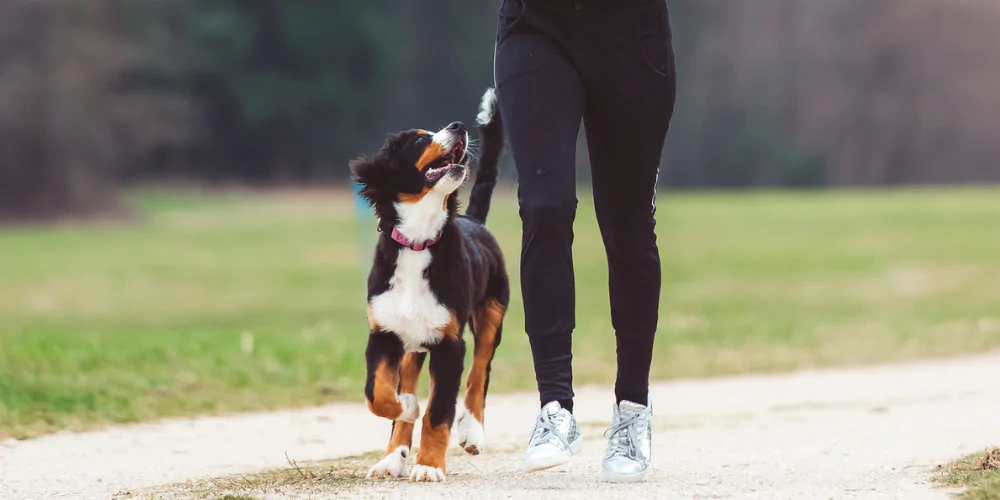

Bernese Mountain Dog size and appearance
Instantly recognisable, the Bernese is a big, beautiful dog. They’re sturdy, gentle giants with a distinctive tri-coloured coat. They have a broad head, happy face and long floppy ears.
Males are typically between 64-70cm tall at the shoulders, weighing between 38-50kg. Females are slightly smaller, standing 58-66cm tall and weighing around 32-43kg.
Their thick, long double coat features a jet-black base with rich rust and bright white markings on the chest, face and paws.
What were Bernese Mountain Dogs bred for?
Bernese Mountain Dogs were bred in Switzerland for farm work such as herding cattle and pulling carts. They’re one of four Sennenhund breeds, which means ‘dogs of the Senn’ – Alpine herdsmen and dairy farmers.
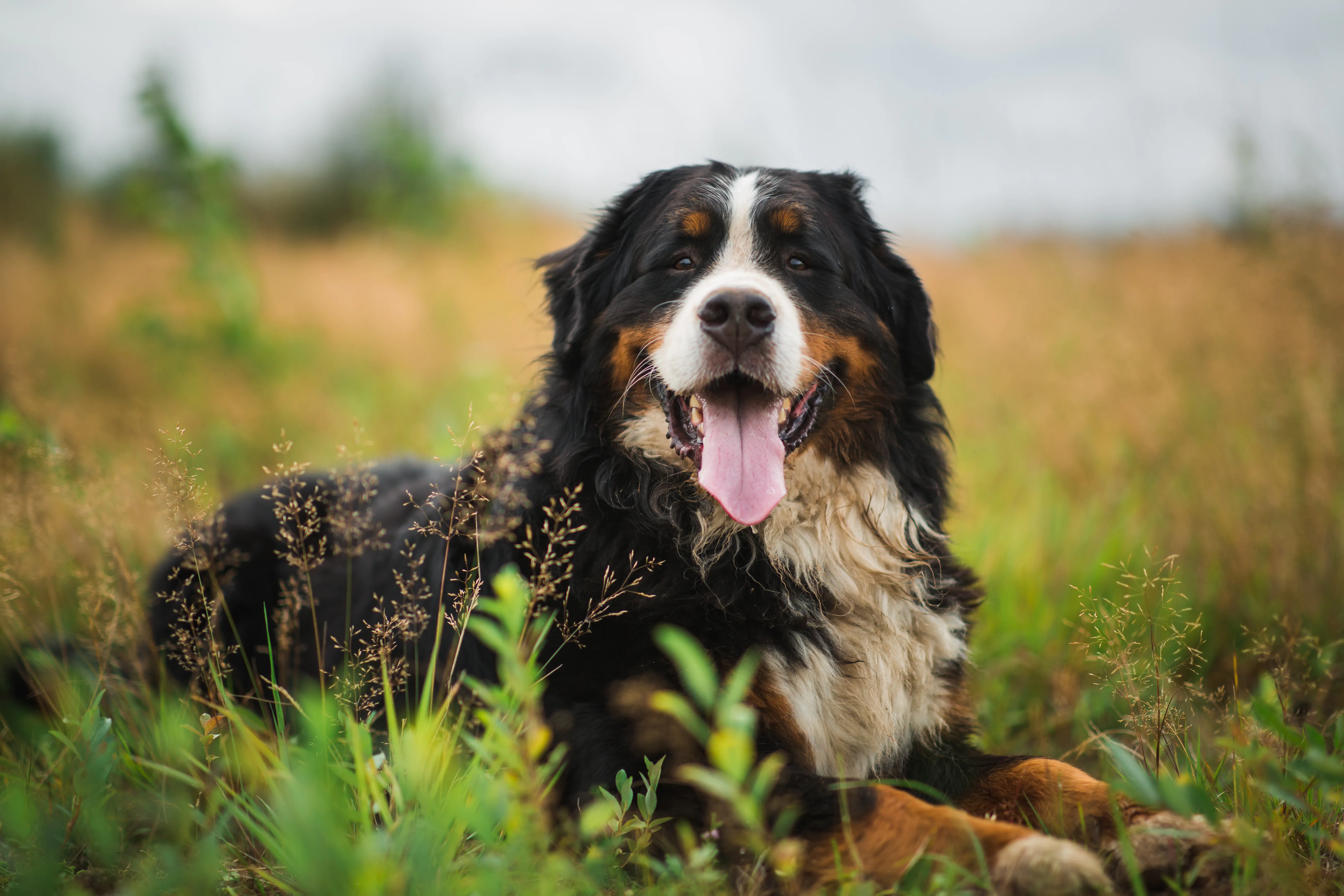

What is the Bernese Mountain Dog’s temperament?
The Bernese Mountain Dog’s personality is:
- Gentle giant: Berners are known for their soft, easy-going nature.
- Affectionate: Bernese Mountain Dogs love family companionship.
- Patient and calm: They’re very good with children, making them great family pets.
- Loyal and protective: They’ll watch over their home with devotion.
- Slightly reserved: Bernese Mountain Dogs may be shy or cautious around strangers without proper socialisation.
Can Bernese Mountain Dogs be left alone?
Bernese Mountain Dogs love being with their family. As such, they’re not great being left alone for extended periods of time, and can suffer from separation anxiety. With training, you may be able to leave them for a couple of hours, but this will be down to both your training and the individual.
It’s worth noting that no dog should be left alone for more than four hours. If you do need to leave them alone for a long period of time, make sure they have access to fresh water, and familiar comforts such as their favourite toys and blanket.
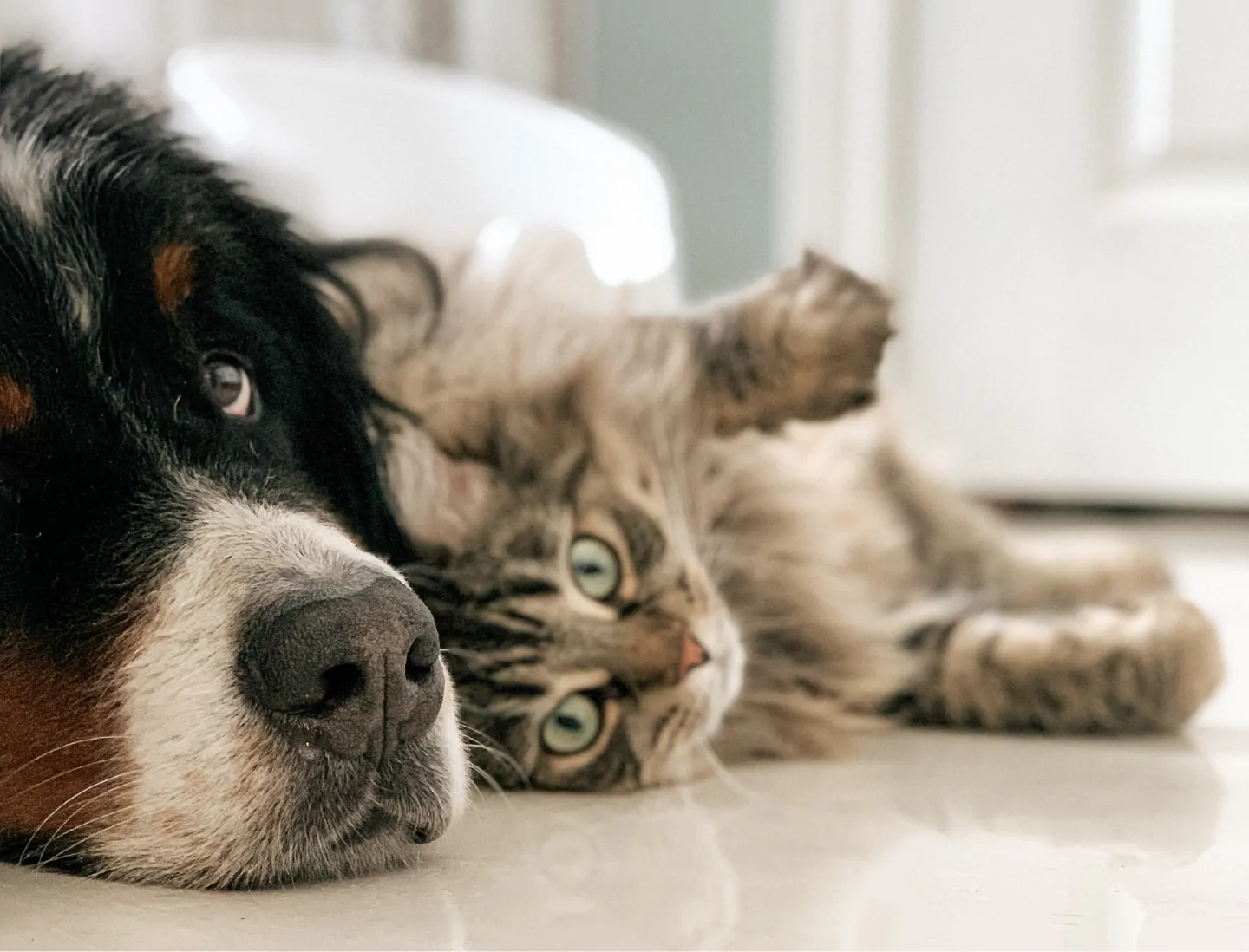

How much exercise does a Bernese Mountain Dog need?
Bernese Mountain Dogs generally have moderate energy levels, although this may vary between individuals. They do need regular exercise to maintain a healthy weight and good muscle tone though. To help keep them physically and mentally stimulated, take them on daily walks and for playtime in your garden. You can also seek out gentle activities like hiking or cart-pulling.
It’s also worth noting that, due to their large size, they’re best suited to homes with plenty of space and ideally a good-sized garden.
Can Bernese Mountain Dogs swim?
Bernese Mountain Dogs can swim, but it’s not a natural instinct for them. Some individuals may be hesitant or even afraid of water. Plus their thick coats can become waterlogged and heavy, which makes swimming more challenging.


Bernese Mountain Dogs are stunning to look at with their characteristic markings, long fluffy coat and large size.
Unfortunately, we as vets do see increased incidence of many conditions in this breed. Most are associated with being a giant breed, such as hip and elbow dysplasia (where the joint develops abnormally and causes painful early onset osteoarthritis) and dilated cardiomyopathy (DCM), where the heart muscle becomes stretched out and thin, leading to rapidly deteriorating heart failure.
It’s important to source a puppy from a reputable breeder. They should be actively working to eliminate these diseases in the breed by participating in health schemes and not breeding from affected animals.
More specific to the Bernese Mountain Dog is an increased risk of cancer, with blood cancers being the most common type. For these reasons, average life expectancy in the breed is less than 10 years old.
Dr Siân Burwood MA VetMB MRCVS


How long do Bernese Mountain Dogs live?
The average lifespan of a Bernese Mountain Dog is around 7-10 years. While this may not seem very long compared with other dogs, it’s fairly typical for larger breeds.
What are the common health issues for a Bernese Mountain Dog?
One consideration for Bernese Mountain Dog owners is the breed’s relatively short lifespan, typically 7 to 10 years. This is partly due to their susceptibility to certain health issues. As a giant breed, hip and elbow dysplasia are fairly common. They’re also prone to bloat (gastric torsion) and certain cancers.
A balanced diet and exercise are important for maintaining a healthy weight, which can help to keep certain health issues at bay. You should also make sure your dog comes from a responsible breeder. They should screen for common genetic conditions, which’ll hopefully mean healthier puppies.
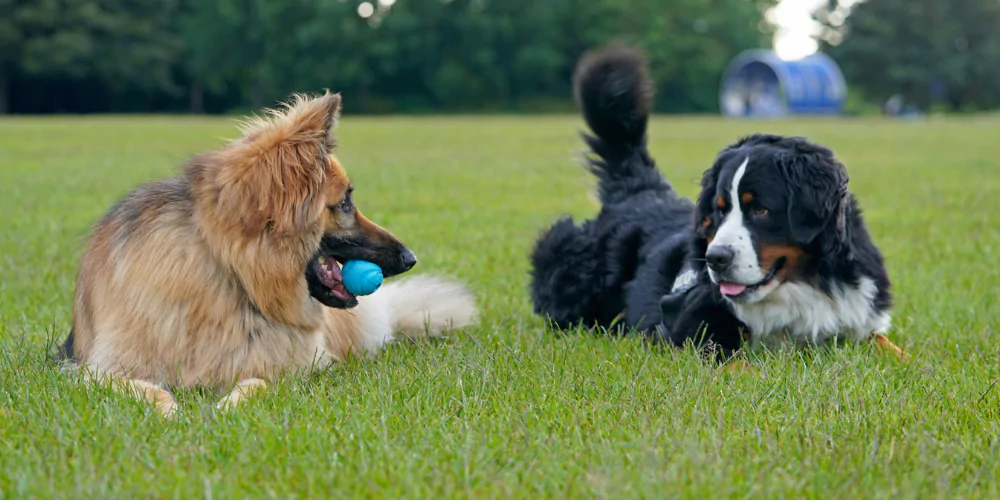

Bernese Mountain Dog grooming and hygiene
Bernese have thick, double coats which are long and silky. This means you’ll need to groom them regularly to prevent matting and tangling. Get busy with that brush. You may need to give them the occasional bath (be aware that with a dog this size, it’s a big undertaking!), and clean their ears too to keep them hygienic and prevent any debris from building up. Plus they’ll need paw and nail checks – maybe even trimming the hair between their pads – and dental care.
Do Bernese Mountain Dogs shed?
Berners shed all-year round, with heavier shedding during seasonal changes in spring and autumn. Brushing several times a week can help manage this, keeping their coat in good condition.
Are Bernese Mountain Dogs hypoallergenic?
No. It probably won’t come as much of a surprise that Berners aren’t ideal for people who are sensitive to allergies, as their thick coats shed frequently. If you or a member of your family has allergies, a responsible breeder will be understanding if you ask to visit a puppy a few times before you commit. This can be a good way to see if any allergic reactions are triggered.


Bernese Mountain Dogs are intelligent and eager to please. This makes them comparatively easy to train, especially if you start early.
Here are a few pointers for training a Bernese:
- Begin training and socialisation early into puppyhood. This’ll help them with their confidence, particularly around other people and animals.
- Positive reinforcement is the way forward with Berners. Reward good behaviour and progress with treats and praise.
- You should be patient and consistent with them, giving them calm, steady guidance.
- It’s best to teach them basic obedience early on too, including commands such as sit, stay and heel.


What insurance do I need for my Bernese Mountain Dog?
The level of dog insurance you choose for your Bernese Mountain Dog will generally be influenced by your circumstances and budget. So you know exactly what you’re getting for your money, read our guide to whether pet insurance is worth it.
We believe all dogs deserve the most comprehensive level of cover as possible, which is why we only sell different types of lifetime cover. We could also cover your Bernese Mountain Dog for any pre-existing conditions they may have with our Lifetime Plus policy, subject to acceptance*.


Guides and advice from experts
Our expert vets and behaviourists have great pointers to help keep your pet happy and healthy.
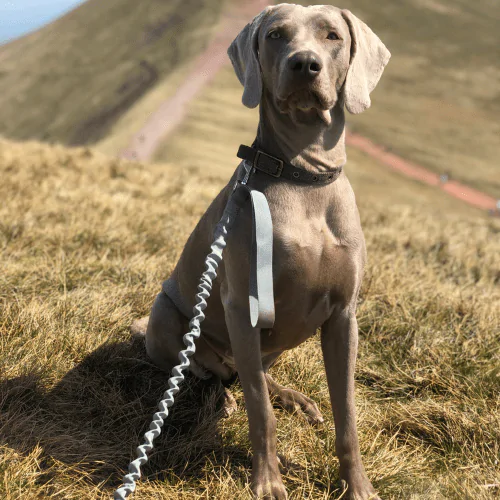
If your dog gets ill or has an accident, you want to give them the best care possible. Let’s take a look at why having pet insurance is important for your pooch.

How to choose the best pet insurance for my pet
We explain the top things you may want to think about when it comes to researching pet insurance policies, including how you can compare pet insurance.

What is lifetime pet insurance?
We’re saying farewell to all of the confusion around lifetime pet insurance. Join us as we explore what it is and how it works.
What’s included in your dog cover
Choosing Petgevity to protect your dog gives you more than just vet fee cover. Here's what you get from our policy.
Dental accident
Covers your pet up to the chosen vet fee limit if they have a dental accident or injury. Always be sure to take your pet for annual dental check-ups, and follow your vet’s advice.
More info
Covers your pet up to the chosen vet fee limit if they have a dental accident or injury. Always be sure to take your pet for annual dental check-ups, and follow your vet’s advice.
Behavioural treatment
Get expert help with your pet’s mental and emotional wellbeing, as advised by your vet. Cover up to your chosen vet fee amount or the cost of up to 12 sessions, whichever is lower (Lifetime Plus); or up to £1,000 (Lifetime).
More info
Get expert help with your pet’s mental and emotional wellbeing, as advised by your vet. Cover up to your chosen vet fee amount or the cost of up to 12 sessions, whichever is lower (Lifetime Plus); or up to £1,000 (Lifetime).
Complementary therapy
As advised by your vet, this covers alternative treatments like acupuncture or hydrotherapy. Cover up to your chosen vet fee amount (Lifetime Plus); or up to chosen vet fee amount or £1,500, whichever is lower (Lifetime).
More info
As advised by your vet, this covers alternative treatments like acupuncture or hydrotherapy. Cover up to your chosen vet fee amount (Lifetime Plus); or up to chosen vet fee amount or £1,500, whichever is lower (Lifetime).
Emergency care
If you can’t look after your pet due to an emergency, such as an unplanned hospital visit, this covers you for up to £1,500 (Lifetime Plus) in minding costs.
More info
If you can’t look after your pet due to an emergency, such as an unplanned hospital visit, this covers you for up to £1,500 (Lifetime Plus) in minding costs.
Third-party liability for dogs
Covers you for legal costs if your dog causes injury to somebody or their pet, or causes loss or damage to someone’s property. Protects you for up to £2 million in a legal action.
More info
Covers you for legal costs if your dog causes injury to somebody or their pet, or causes loss or damage to someone’s property. Protects you for up to £2 million in a legal action.
Choice of optional extras
Need extra protection? Choose from several optional extras to cover your pet’s needs, including dental illness, or cover if your pet is stolen or lost.
More info
Need extra protection? Choose from several optional extras to cover your pet’s needs, including dental illness, or cover if your pet is stolen or lost.
Dental accident
More infoBehavioural treatment
More infoGet expert help with your pet’s mental and emotional wellbeing, as advised by your vet. Cover up to your chosen vet fee amount or the cost of up to 12 sessions, whichever is lower (Lifetime Plus); or up to £1,000 (Lifetime).
Complementary therapy
More infoAs advised by your vet, this covers alternative treatments like acupuncture or hydrotherapy. Cover up to your chosen vet fee amount (Lifetime Plus); or up to chosen vet fee amount or £1,500, whichever is lower (Lifetime).
Emergency care
More infoIf you can’t look after your pet due to an emergency, such as an unplanned hospital visit, this covers you for up to £1,500 (Lifetime Plus) in minding costs.
Third-party liability for dogs
More infoCovers you for legal costs if your dog causes injury to somebody or their pet, or causes loss or damage to someone’s property. Protects you for up to £2 million in a legal action.
Choice of optional extras
More infoNeed extra protection? Choose from several optional extras to cover your pet’s needs, including dental illness, or cover if your pet is stolen or lost.
*Cover for pre-existing medical conditions is subject to acceptance. They will not be covered unless you have declared them and they are shown on your Confirmation of Cover.

